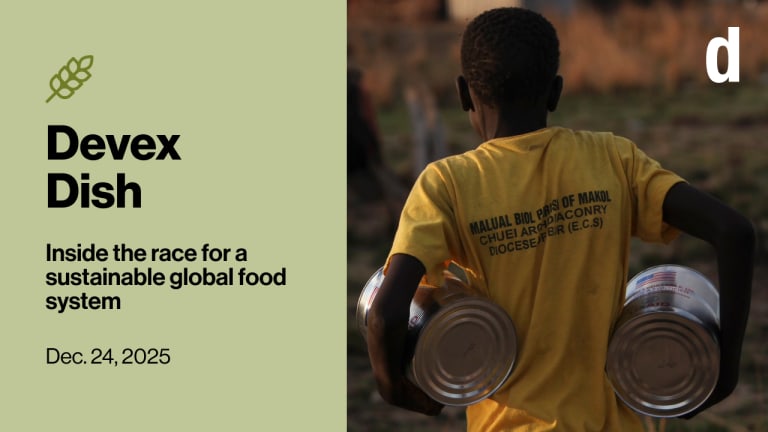What's the big idea? Writing better speeches and op-eds
A memorable speech or op-ed is original, surprising, and insightful. Learn how to write a good speech or opinion piece in this fourth installment of Devex's five-part Writing for Development series.
Speeches and op-eds can be powerful tools — as long as you capture people’s attention. Think of a good speech you’ve heard or op-ed you’ve read. What made it worthwhile? Did the speaker or author use a particular rhetorical device, a compelling headline, or a surprising statistic? Or, content aside, maybe it was just the writer’s reputation that made it memorable? “Memorable.” This is the key word. The speech or op-ed was good enough for you to remember it. Or you remembered it for at least a few hours or days, enough for it to get lodged in the folds of your brain — enough for you to go visit the speaker’s website later, or enough to recall the op-ed to a friend interested in the topic. Op-eds and speeches share some important characteristics. Forgettable speeches and op-eds are cliché, obvious, and explanatory. Memorable ones are original, surprising, and insightful. Here are some ways to fall on the right side of that ledger. Answer the questions in your audience’s mind In writing a speech or an op-ed, you are presuming to take some of the audience’s time and attention. Now you have to make that expense worth it for them. Whether explicitly or implicitly, you must answer the questions they have for you: • Why you? There must be a reason that you, in particular, are writing and not somebody else. Sometimes your value — or the value of the person you are ghostwriting for — is implicit; such is the case for human rights experts discussing, say, child soldiers. You might also make it explicit, for example, by telling a story about growing up in a country with underage combatants or showing the eagle-eyed view your work affords you. • Why care? Your speech should make your audience care. If you’re addressing a group of women entrepreneurs, tell them why your work on child soldiers is relevant to their concerns — such as how ending child conscription lowers violence against girls and women or improves the economy. Use caution, though; appealing strictly to your audience’s self-interest might sound crass and backfire, especially in the case of something so plainly immoral as pushing children into war. • Why now? To attract a bigger audience, connect your writing to current events — for example, a surge in child soldiers in a given country, the anniversary of the start of a war, an event your organization is sponsoring, or World Children’s Day. The relevance of your topic need not be so direct, but it should not be a stretch, either. Have 1 central idea Craft your op-ed or speech around one central idea, which you develop throughout the course of about 800 words or eight minutes. (That’s a guideline, not a hard-and-fast rule.) In our example of child soldiers, the big idea might be this: “If we allow children to be conscripted as soldiers, we guarantee that there will be lasting war.” Don’t give away your whole idea up front — otherwise, there is no reason for your audience to stick with you to the end. Instead, introduce your idea with a relevant question, statistic, or story. To continue with our example, we might start by asking, “What happens when a child soldier grows up? What will her life be like in another 20 years?” We have lured our audience in by asking them to think along with us. Next, we might tell a few stories to answer our opening question: a child soldier who became addicted to drugs and died; another who, tragically, carries the violence he learned in war into his home life; a third who escaped and is now an activist for peace and children’s rights. Three is a magic number in rhetoric, by the way — three stories or arguments support your central idea just as the legs of a stool support the seat. End your speech or op-ed by returning to the idea you introduced at the beginning, having deepened your audience’s understanding in the previous minutes or paragraphs. In our example, we might end with an explicit statement that was only hinted at in the beginning: “For many child soldiers who survive, the war never ends. As long as we have child soldiers, we are condemning ourselves to decades of conflict, even if the fighting stops.” Leave them wanting more Working in the development field, you may have a lot of ideas and knowledge. And when you get the chance to address an audience through a speech or an op-ed, you might be inclined to take full advantage of the opportunity by cramming in every bit of information you can. Resist that temptation. Pack too much information into your writing and you risk losing your audience. This is especially true of speeches, which by virtue of being spoken are harder for listeners to follow; in an op-ed, at least, readers can take a second look and grasp whatever they missed the first time. Instead, leave the details for your website or a white paper. Make your speeches and op-eds short. Just as the purpose of a cover letter and resume is to get you a job interview, the purpose of a speech or op-ed is often to get audiences to take only the next step, not the next 10 steps — to read more about the topic of your speech, to tweet about your op-ed, or to make a small donation. By delivering a good speech or op-ed — a short one — you leave the audience wanting more. That “more” is the action they’ll take to get more involved in the work of your organization.
Speeches and op-eds can be powerful tools — as long as you capture people’s attention.
Think of a good speech you’ve heard or op-ed you’ve read. What made it worthwhile? Did the speaker or author use a particular rhetorical device, a compelling headline, or a surprising statistic? Or, content aside, maybe it was just the writer’s reputation that made it memorable?
“Memorable.” This is the key word. The speech or op-ed was good enough for you to remember it. Or you remembered it for at least a few hours or days, enough for it to get lodged in the folds of your brain — enough for you to go visit the speaker’s website later, or enough to recall the op-ed to a friend interested in the topic.
This article is exclusively for Career Account members.
Unlock this article now with a 15-day free trial of a Devex Career Account. With a Career Account subscription you will get:
- Full access to our jobs board, including over 1,000 exclusive jobs
- Your Devex profile highlighted in recruiter search results
- Connections to recruiters and industry experts through online and live Devex events
Start my 15-day free trialAlready a user?
Printing articles to share with others is a breach of our terms and conditions and copyright policy. Please use the sharing options on the left side of the article. Devex Pro members may share up to 10 articles per month using the Pro share tool ( ).
Paul is a writer, editor, and communications trainer who has worked for the U.N. Development Programme, UNFPA, UNICEF, and the U.N. Secretariat. He authored a pair of guides on "Philanthropy and the SDGs" for Rockefeller Philanthropy Advisors, and has consulted with foundations on how to align their work with the SDGs. Previously, he has worked in the fields of oral history, theater, and documentary film, and wrote a guide for Working Narratives on "Storytelling and Social Change."








